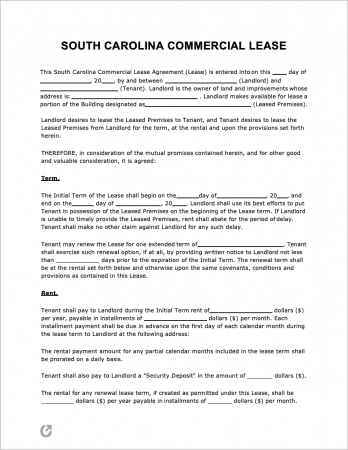
South Carolina rental lease agreements establish the terms and boundaries for a tenant occupying a landlord’s property. Landlords select the form according to the property type and the rental duration (i.e., monthly or yearly). Both parties sign to indicate their awareness of the form’s conditions and agree to the obligations listed. To prevent confusion, the landlord and tenant should discuss each lease section before officially entering their signature.
Commercial real estate properties allow for much negotiation as the lessor and lessee must determine their payment schedule and legal abilities. Residential properties are usually more standard as the tenant sets the rates and regulations before a tenant signs. However, negotiations are still possible, which can promote the landlord’s credibility and ratings.

Commercial Lease Agreement – Used for leasing property (buildings, rooms, floors, etc.) for a fixed period of time to a business tenant.
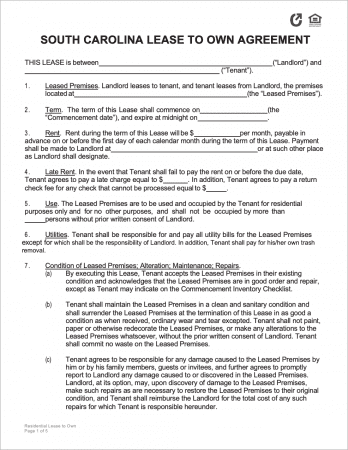
Lease to Own Agreement – Serves two (2) purposes: 1) allows homeowners to lease their property for a set number of years, and 2) provides them with a means of setting a home purchase price that the tenant(s) renting the property can choose to act on.
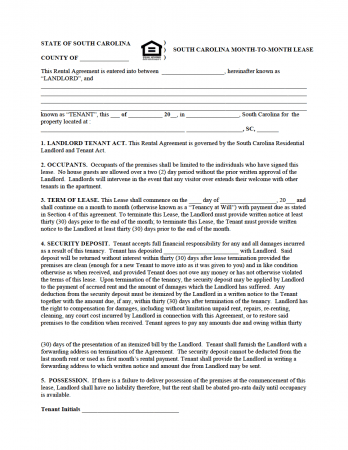
Month-to-Month (Residential) Rental Agreement – Spans a single month at a time, renewing automatically until either party terminates it. A thirty (30) days’ notice is required before the agreement ends.
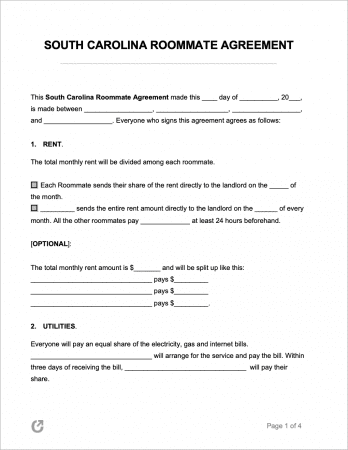
Roommate Agreement – Used by roommates to set a cooperative atmosphere by determining rules regarding guests, personal possessions, quiet hours, cleaning, dishes, and other relevant matters.
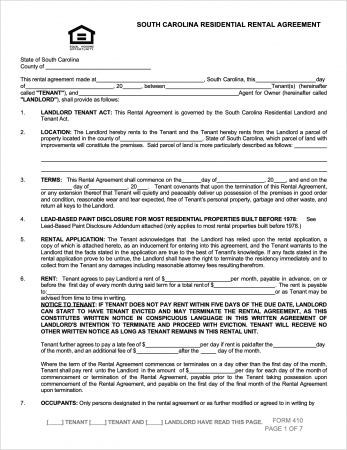
Standard Residential Rental Agreement – The most basic lease used for establishing yearly leases. Complies with all rental laws dictated by South Carolina.
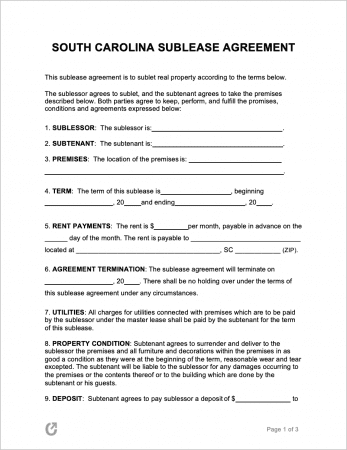
Sublease Agreement – Completed by tenants that need to vacate their rental, allowing them to legally introduce a secondary tenant to take over subsequent lease payments.
A South Carolina Lease Agreement is a landlord-drafted form that contains the rules and obligations that the landlord and tenant(s) agree to follow until the lease’s end date. Creating a lease comes directly after the landlord has screened and identified a viable tenant via the use of a rental application.
Landlord-Tenant Guides / Handbooks
According to § 27-40-310(c), tenants have to pay rent on the time and place as contained in the lease (typically in monthly installments at the beginning of each month). There is no grace period specified in the state’s landlord-tenant laws.
Emergency (§ 27-40-530(b)(1)): Landlords do not need a tenant’s consent prior to entering the rental unit at any time in emergency situations.
Non-Emergency (§ 27-40-530(c)): Landlords need to give tenants a minimum of twenty-four (24) hours prior to making entry, and can only enter at reasonable times.
Exception: Notice does not need to be provided for regularly scheduled services, such as those relating to changing air filters or treating pests, as long as it has been clarified in the lease.
As outlined by § 27-40-440, landlords in South Carolina are obligated to comply with the following:
Section 27-40-510 states the duties/obligations of tenants as follows:
Maximum: No statute.
Returning to Tenant (§ 27-40-410(a)): Deposits must be returned within thirty (30) days after the termination of the lease. If the landlord intends to keep any portion of the deposit due to damages (or other costs), the landlord must provide the tenant(s) with an itemized list containing each deduction. The tenant must provide the landlord with a forwarding address or new address that the deposit should be sent.
Deposit Interest: No statute.
Uses of the Deposit (§ 27-40-410(a)): Deductions are permitted to cover: